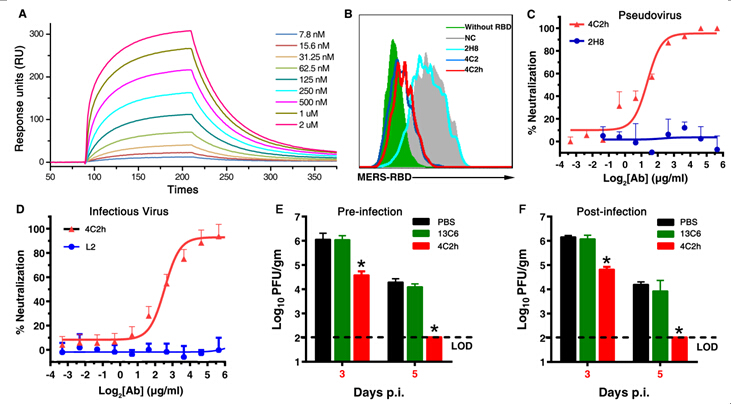Since September 2012, 1569 laboratory-confirmed cases of human infection by the Middle East respiratory syndrome coronavirus (MERS-CoV) have officially been reported to World Health Organization (WHO) as of September 23rd 2015, including at least 554 related deaths with a fatality rate of ~35 %. The persistent transmission of MERS-CoV in the Middle East and the recent re-emergence of MERS-CoV infection in South Korea constantly reminded the need for effective counter-measures, including vaccines, drugs or neutralizing antibodies.
In 2013, Prof. George F. Gao's group identified the receptor-binding domain (RBD) of MERS-CoV spike protein (or MERS-RBD) and solved the structure of MERS-RBD in complex with its receptor CD26. Recently, joint work from his and Prof. YAN Jinghua’s group identified two neutralizing monoclonal antibodies (mAbs) 4C2 and 2E6 which target MERS-RBD. The two mAbs were obtained from immunized mice, showing specific binding to MERS-RBD, and could block virus entry in vitro with high efficacy.
They further investigated their mechanisms of neutralization by crystallizing the complex between the antibody Fab fragment and MERS-RBD. The structure of the 4C2-Fab/MERS-RBD complex was solved at high resolution. It showed that 4C2 recognizes an epitope that partially overlaps the receptor-binding footprint in MERS-RBD, thereby interfering with virus/receptor interactions by both steric hindrance and interface-residue competition. 2E6 also blocks receptor binding, and competes with 4C2 for binding to MERS-RBD.
Based on the structure of the complex, they humanized 4C2 by preserving the paratope residues and substituting the remaining amino acids with the counterparts from human immunoglobulins. The humanized 4C2 (4C2h) antibody sustained similar neutralizing activity and bio-chemical characteristics to the parental mouse antibody.
Finally, animal experiments showed that 4C2h can significantly abate the virus titers in lungs of Ad5-hCD26–transduced mice infected with MERS-CoV, therefore representing a promising agent for prophylaxis and therapy in clinical settings
Prof. Kwok-Yung Yuen's group from the University of Hong Kong did the live virus infection and Prof. Stanley Perlman's group from the University of Iowa did animal challenge experiment.
This work was published on Cell Research (http://www.nature.com/cr/journal/vaop/ncurrent/full/cr2015113a.html). It was supported by National Basic Research Program of China (973 Program), the China National Grant Science and Technology Special Project, the National Natural Science Foundation of China, the National Institutes of Health, USA and Hong Kong Research Grants Council.

Key Words: MERS-CoV, neutralizing monoclonal antibody, humanization
Contact:
George F. Gao, DPhil (Oxon)
Director and Professor
CAS Key Laboratory of Pathogenic Microbiology and Immunology
Institute of Microbiology
Chinese Academy of Sciences (CAS), Beijing, China
YAN Jinghua, PhD
Professor
CAS Key Laboratory of Microbial Physiological and Metabolic Engineering
Institute of Microbiology, CAS, Beijing, China
